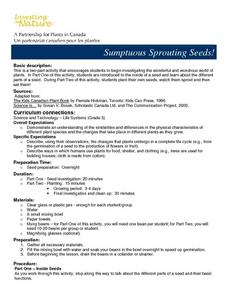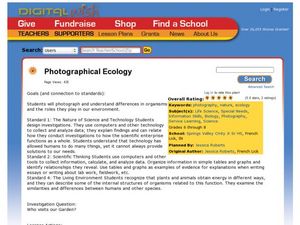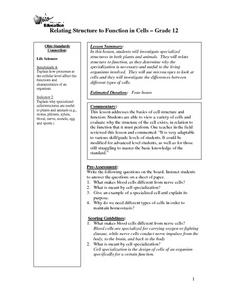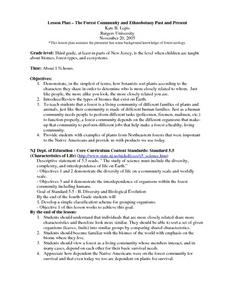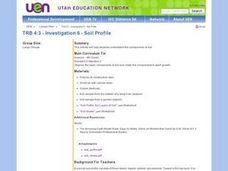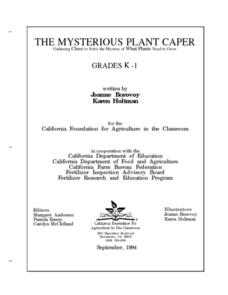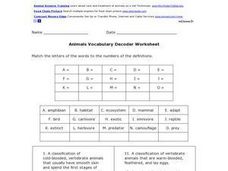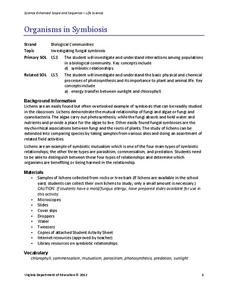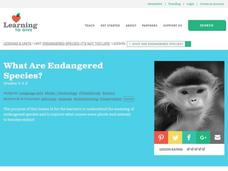Curated OER
The Discovery of Photosynthesis
High schoolers explore how scientists discover photosynthesis. In this biology lesson, students identify the basic requirements for photosynthesis to happen. They recreate past scientists' experiments and record their observations.
Curated OER
Bird Up
Third graders identify basic physical and behavioral characteristics of birds and how they adapt to their environments. To organize and share scientific information with peers. They discuss similarities and differences among birds....
Curated OER
Sumptuous Sprouting Seeds!
Third graders investigate the wonderful and wondrous world of plants. They examine the inside of a seed, explore the different parts of a seed, plant their own seeds, watch them sprout and then eat them! They describe, using their...
Curated OER
Please the Trees, But Not These, Please!
Students study trees. In this forestry lesson, students complete a variety of activities where they learn the basic parts of a tree and their functions.
Curated OER
Photographical Ecology
Students study organisms and the roles they play in nature. In this ecology lesson, students photograph several examples of organisms during a nature walk. Students print out their photos and classify the organisms as plants or animals.
Curated OER
Understanding How Potatoes Grow
Second graders make a KWL chart and brainstorm what they need for the project of growing potatoes. They choose one potato and plant it in water or peat moss cups and choose a location in which meets the needs of the plants and make their...
Curated OER
Plant Transpiration
High schoolers conduct various experiments to investigate plant transpiration. In this biology instructional activity, students explain how this process helps maintain the hydrologic cycle. They measure the rate of water loss in plants...
Curated OER
Relating Structure to Function in Cells
Twelfth graders investigate specialized structures in both plants and animals. They relate structure to function, as they determine why the specialization is necessary and useful to the living organisms involved. They use microscopes...
Curated OER
Lesson 3: Nutrition, Labeling and Packaging
Students explore basic nutrition concepts to help them select healthy diet, evaluate food intake, discuss major food labeling issues, design labels for food products, examine history of food packaging development and how packaging...
Curated OER
Photosynthesis
Young scholars conduct a variety of experiments on photosynthesis. In this biology lesson plan, students identify the factors required for the process to occur. They perform computerized experiments to test the amount of oxygen produced...
Curated OER
The Forest Community And Ethnobotany Past And Present
Students describe a forest as a living community. They determine members interact, and in many cases, depend on each other for their basic survival needs. They investigate how dependent the Native Americans were on the forest...
Curated OER
Investigation 6 - Soil Profile
Fourth graders study the components of soil. They observe the basic components of soil and relate the components to plant growth. They record color, texture, and kinds of materials on their profile log (light color, denser, grittier -...
Curated OER
Teaching Kids about the Environment
Fifth graders identify the species of plants and animals found in an environment. They compare these findings to plant and animal species found in an unlike environment. Students acquire and compare soil samples from the two sites chosen.
Curated OER
The Mysterious Plant Caper
Students investigate the basic parts of plant and that plants are living things which require water, air, light and nutrients for survival. They do this through a series of scientific experiements and multi-curricular hands-on activities.
Curated OER
Animals Vocabulary Decoder Worksheet
Add some decoding to your scholar's review of basic life science terms in this decorder instructional activity, where students match 15 words to their definitions. Words such as mammal and amphibian must be matched to their written...
CK-12 Foundation
Cellular Respiration: Can Photosynthesis Be Reversed?
Cellular respiration and photosynthesis relate closely, but many don't realize how. Scholars drag and drop the reactants and products to the chemical reactions for both processes. Then they answer three multiple-choice questions.
Virginia Department of Education
Organisms in Symbiosis
Searching for an activity that allows emerging biologists to explore symbiosis up close and personal? Pupils collect samples and view lichens through a microscope and conclude with a discussion about the relationship they have...
Polar Trec
Where is the World's Water?
Scholars discover the amount of the Earth's water in various locations such as the ocean, ice, the atmosphere, etc. They then make a model of the how much water those percentages represent. Finally, analysis questions bring the concepts...
Curated OER
Exploring Ecosystems
Fourth graders create an ecosystem as a class. They have already produced smaller ones. They use a pond or something similar on school grounds to meet the needs of certain plants and animals of their ecosystem. Specifically created will...
Curated OER
Classifying Living and Non-Living Objects
Students investigate living organisms and define the properties of a living species. In this life characteristic lesson, students examine plants in their class and discuss whether or not they are alive. Students create a...
Curated OER
What Are Endangered Species?
Students explore the concepts of endangered and extinct animals. In this animal protection lesson, students discuss and define the words endangered, extinct, and habitat. Students share why they think it is important to protect...
Curated OER
Algae Experiments
Students describe the characteristics of algae. In this biology lesson plan, students perform a series of experiment to explore algae. They investigate the basic things algae need to survive.
Curated OER
Learning From Leaves: From Observation to Inference
Students examine the adaptation of plants to their environments. They analyze and observe the structure, shape, and internal structure of various leaves, and make inferences about the structures.
Curated OER
Case of the Missing Pumpkin
Fourth graders explore holidays by participating in a pumpkin activity. In this vegetation lesson, 4th graders discuss the different uses for pumpkins, not just Halloween decorations. Students identify the nutrients pumpkins need to...




